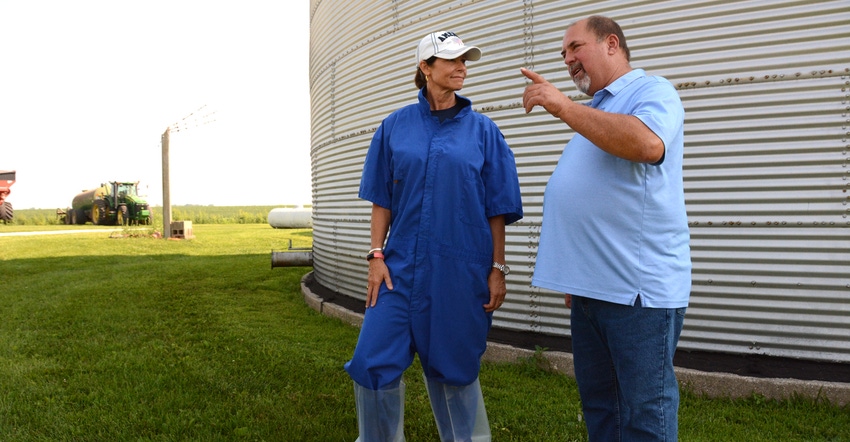August 26, 2021

Curt Zehr knows this: His parents bought some of the ground he farms for $750 an acre. Today, that ground is worth $15,000 an acre. And if Congress enacts the Biden administration’s Build Back Better tax plan without an exemption for family farms, Zehr’s family will pay a 40% tax on everything after the first million dollars.
“I can envision us having to sell 25% to 50% of our ground to pay that tax, if stepped-up basis goes away,” Zehr says. And then he looks away, shakes his head.
He’s not being dramatic. He’s being realistic. The fifth-generation Washington, Ill., grain and hog farmer echoes the panicked concerns of family farmers all across the country right now, which make up more than 96% of all U.S. farms. None of them wants this tax plan to go forward without an agricultural exemption.
What does the plan do? Currently, it would eliminate the step up in basis above $1 million per individual or $2 million per couple. Second, the plan would increase the capital gains tax to as much as 43.4% for individuals with an income over $1 million. And finally, the plan would place a cap on the use of like-kind exchanges.
Multigenerational family farmers say this will lead to massive losses in equity, to land sales, and to consolidation of land into the hands of wealthy investors and corporations. Farm managers say it could lead to enormous disruptions in the land market, affecting supply, demand and value.
The numbers don’t lie:
More than 370 million acres are expected to change hands in the next 20 years.
Land values are up more than 120% since 1997 in more than half the states in the country.
In Illinois and other Midwestern states, land is up more than 200% and sometimes 300% since ’97.
Farmers and ranchers are facing an average capital gains tax of $560 per acre, according to the American Farm Bureau Federation.
Projected average return per acre on a central Illinois farm in 2021 is $220 for corn and $290 for soybeans, according to the University of Illinois.
Capital gains applies to land and equipment, so a fully depreciated combine would be taxed at the $250,000 value.
Come out to the farm
Farmers and farm organizations have launched a full-court press to tell their story. Zehr recently hosted Rep. Cheri Bustos, D-Moline, on his farm, to tour the grain, feed and hog production buildings, and to hear why taking away stepped-up basis and increasing the capital gains tax would be a real problem for his family.
She stood listening on Zehr’s farm and then put an exclamation point on his argument: “That is why you’ve gotta have an exemption.”
The Biden tax plan problem wasn’t news to Bustos, who sent a letter back in May to House leadership asking for a full exemption for family farms and small businesses in the tax plan. She was one of 13 House Democrats who authored the letter, all representing rural districts.
Eleven Republican senators sent a similar letter to Senate leadership, and Republican members of the Senate Ag Committee sent a letter to Secretary of Agriculture Tom Vilsack, asking him to clarify USDA’s statement that under the new tax plan, 98% of farm estates would not owe any tax at transfer after a death, provided the farm stays in the family.
That’s a lot of letters, and a lot of questions being asked.
How did we get to this point? Bustos says of her fellow Democrats: “I think people looking at the policy didn’t understand what it is to be a multigenerational family farm.”
Still, she’s incredibly optimistic. “I think we’re going to be successful in making sure that is not part of any new tax code,” Bustos says. And she’s trying hard to reassure farmers.
“I really don’t want our family farmers to be alarmed about this at this point,” she says. “We’ve gone to bat for them. We’ll continue to make sure we have pressure on, and we’ll continue to make sure we get this in the right place.”
Despite those assurances, farm groups say this isn’t the time to let up. Jennifer Tirey, Illinois Pork Producers Association, wants farmers to contact their members of Congress and senators, and tell their specific story: “I bought this 160-acre farm for this many dollars in this year, and now it’s worth this many dollars and this is how much I’ll have to pay if you don’t exempt me from this tax.”
Voices count. Your voice counts. You’ve got a compelling story, and now’s the time to tell it, because agriculture has enough problems. We can’t afford to lose major chunks of multigenerational family farms, thanks to ill-informed tax code. Don’t wait.
Comments? Email [email protected].
You May Also Like




